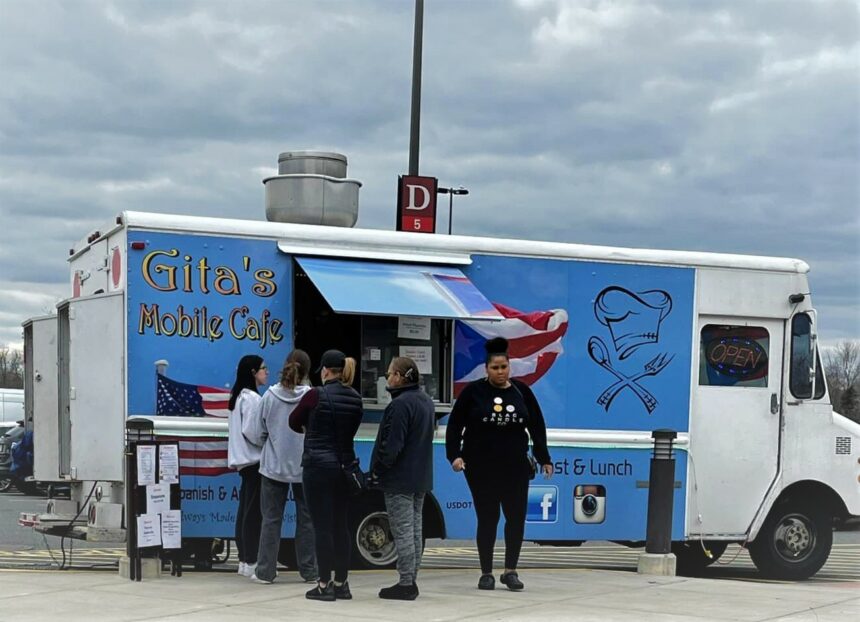Camden, NJ- On March 17, 2022 at 6 PM many aspiring entrepreneurs came together to learn about the important aspects of food trucking by attending Food Trucking 101. This course gave entrepreneurs a roadmap on how to navigate the start-up phase and learn best practices for aspiring operators. The class covered mobile food business models, matching the menu to the model, investment analysis, legal requirements, licenses needed, inspections that are to be done, fire/propane safety and food preparation regulations.
Before entrepreneurs turn that key and put his or her truck into the accelerating gear the following areas need to be addressed: food truck culture, intestinal fortitude, quality cuisine, the truck itself (what type is it), branding, speed of output, capacity for storage and functionality of equipment. Also, choosing a business model will depend on the entrepreneurs’ current position, level of commitment and goals for the business. How does an entrepreneur go about determining the right business model? Start by simply answering the following questions:
(1) Do you have a day job?
(2) Do you work Monday-Friday
(3) Are you free on weekends?
(4) Do you want to supplement income?
(5) Do you want to replace your current job’s income?
(6) Do you want to capitalize a brick and mortar?
“You want to make sure that clients do not walk away from your truck so how you build a food truck that people will come toward is really important,” Jamila Powell, Program Manager of LAEDA’s Women’s Business Center expressed.
Coming up with goals are vital because the kitchen and the food truck will be conditioned to where the entrepreneur wants to go and that is why thinking about where the entrepreneur will be driving that truck is vital in deciding the small business journey and seeing which roadmap to follow in creating a successful venture/drive.
How do you select a food concept for your truck? By having a unique concept and making sure that your food concept is different from your competitors in your area. However, it must also be easy to understand because then customer’s will not understand it.
“Have a menu and concept for people that is easy to understand,” Jamila Powell mentioned, “People should know at a moment’s glance who you are and what you do.”
Entrepreneurs should also keep up with the current food trends so that way he or she can update their menu with trending items and keep his or her wheels moving toward success. Before the start of something we always put it to test so do not forget to validate your menu with taste tests by doing the following: hosting a taste testing party, running a short pop up restaurant and getting feedback from family, friends, staff, local foodies and etc.
During the class, we also discussed how not any road is what an entrepreneur should drive his or her food truck on. An entrepreneur has to think before turning or driving his or her food truck about the following: who you are when the world sees you, what to expect when your customers come to visit your truck, what is your cuisine, and what is your menu items (make sure they are food truck friendly). This will help determine the trucks size, navigations for driving and even parking.
While deciding the menu is a tasteful side, entrepreneurs cannot forget the legal aspects of the food truck industry. Cities have various of requirements, including health department certificates, truck permits and parking restrictions. Please do not forget that each city has its own policies, thus contacting your local government is a must before you go on the road with your food truck in driving gear. You also need to make sure to not push down on the gas petal without the required food truck licenses and permits such as the ones discussed in class tonight: Business Registration or Doing Business As, Federal Tax ID (EIN), State EIN (if you hire employees), and Reseller Permit.
Be prepared for obstacles and the bumps and turns that will come along the drive and or path as you are planning, launching and growing your food trucking business.
Our alumnus was the guest speaker in this class, Chef Davit Martinez with Gita’s Mobile Café where the food is something different than your original food truck and it is made on site and “Always Made with a Twist” and he disclosed many aspects of the food truck and its industry to the entrepreneurs in the class tonight.
LAEDA offers seminars and short-term courses in various counties of South Jersey throughout the year. A long-term course is also offered three times per year where entrepreneurs receive 72+ hours of training from industry professionals, business planning, and business counseling. The program is free, but you must qualify.
LAEDA welcomes you to join our community of successful entrepreneurs; please call (856) 338-1177 to learn more.
Click here to change this text


